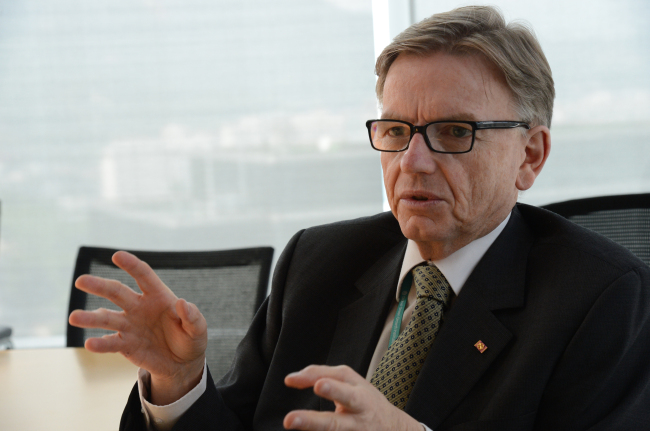The Global Green Growth Institute will focus on reinforcing collaborations between governments and the private sector to help developing countries to pursue environment-friendly growth, its new chief Howard Bamsey told The Korea Herald.
The “think and act” tank was set up by the Korean government in 2010 to bridge the rich and poor countries and share technologies and experiences for sustainable development across the world.
The Seoul-based institute was upgraded into an official international organization last year. It has 20 member countries and runs offices in London, Abu Dhabi and Copenhagen.
On Thursday, it was also recognized as a vehicle to execute official development assistance by the Organization for Economic Cooperation and Development’s international aid committee. The approval is expected to further spur its growth and attract more donations from rich countries.
In line with its growing roles, the GGGI plans to increase its workforce from the current 100 to 130 by the end of the year.
But the priority will be given to developing customized strategies and securing effective investment over external expansion, he said.
 |
| Howard Bamsey, director general of the Global Green Growth Institute. ( Chung Hee-cho/The Korea Herald) |
“We’re happy to expand because this is a ‘global’ green growth institute but we don’t want to risk any weakening of the relationships we have now as a result,” he said in a recent interview.
“So we’re balancing the need to continue to consolidate and strengthen those relationships to make them work well, with the need to expand our capacity.”
Bamsey took the helm of the GGGI last month, succeeding inaugural director-general Richard Samans who has returned to the World Economic Forum as managing director for global cooperation.
After spending three years as Canberra’s special envoy for climate change until 2011, Bamsey served as a special advisor on green growth at the Australian Agency for International Development, during which he played an active role in the GGGI Council’s transitional subcommittee in charge of the organization’s status upgrade.
The Australian scholar has also taught at Australian National University’s Climate Change Institute and the University of Sydney’s United States Studies Center.
With ample field experiences, he stressed the significance of cooperation with other key players, especially in the face of economic slowdowns and struggling clean energy markets.
“We need to build collaboration between the private sector, who of course invest money, and the public sector whose role is to support and encourage private-sector financing and make it happen,” Bamsey said.
“When the time comes for the planning to be implemented in an individual country, that’s where the public-private cooperation becomes really instrumental, because we will need creative financial architecture to ensure that the sort of investment the country’s looking for takes place.”
The GGGI supports developing countries in integrating environmentally sustainable growth strategies into their economic goals.
It is currently working in 17 countries including China, Brazil, Indonesia, Ethiopia and Vietnam in consultation with the respective governments, financial institutions and other local and international agencies including the World Bank, UNDP and UNEP.
Though global efforts have made little headway to seal a new climate accord, it is an “exciting time” for middle powers like Korea and Australia that have adopted or are planning ambitious programs such as a cap-and-trade and carbon tax, Bamsey said.
The two countries’ initiatives, as well as the GGGI’s success, will take on a crucial role in the negotiations by invoking positive feedback, giving their delegations a bigger say and prompting others to take action themselves.
“One of the key reasons I agreed to this job is that one way you can promote an agreement at that negotiating table is by demonstrating that green growth works, that it works for countries, that it delivers prosperity, and that it helps us meet the environmental concerns we all know about,” he added.
“We certainly need to accelerate the pace of change because the numbers (of greenhouse gas emissions) look quite challenging at present. And seems to me that’s the way of just doing that.”
By Shin Hyon-hee (heeshin@heraldcorp.com)
Original article here